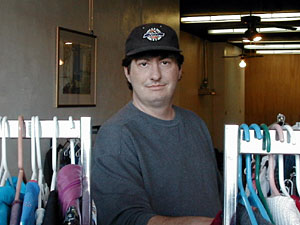|
Audio
Photos
Your Voice
|
Recycling project helps needy people
February 4, 2003
 |
| Chris Dunn and his wife run the United Shoe Project. They are the only paid staff. (MPR Photo/Bob Reha) |
Moorhead, Minn — Chris Dunn walks along a wall lined with shoes. There are all kinds of footwear, from work boots to dress shoes. The front of the store has racks of clothes. There are shirts, pants and jackets of all types and styles. Some folks might see worn out rags on these racks. Dunn sees opportunity.
"The clothing that we take in that isn't wearable, that might have a little tear on it, or a little stain on it, we have a warehouse here in town. All that product gets baled up and sent into rag companies then they pay for it," says Dunn. "Thats what pays for the diapers, the toilet paper things like this along with the money that we bring in from the shoes."
Dunn and his wife run the United Shoe Project. They are the only paid staff. The project recycles all types of textiles. In the back there is a storage area stacked with brand new items. Mostly household necessities. Goods for needy families.
 | |||
"All of this stuff here the shampoo, the dish soap, the bleach, the laundry detergent, toilet paper, diapers it goes out to families that might run short during the month. It's a program that actually the shoes that we recycle, pays for," says Dunn.
Dunn says the United Shoe Project was started by investors as a for-profit recycling business. It still is. Investors put up $10,000 to start the company. In just a few weeks, they've more than doubled their investment. But $17,000 of that profit, has been turned back to subsidize the give away.
Dunn discovered some of the goods tagged for recycling could still be used. But if he turned those items over to local non-profits, they'd be sold at thrift stores. Chris Dunn wants to give them away.
"You have to understand that they have to run their thrift stores too, and they have to pay for their drivers and they have to pay for their employees," says Dunn. "And by the time they get all done with that they just can't afford to put out $1,000 a month for clothing and shoes and things like that for people in the area, it's just impossible to do."
Contributions for the United Shoe Project are dropped off in front of the store and at bins at local K-Marts. Dunn says in the five weeks they've been open, more than 300 people have gotten clothing or free household supplies. He's even found used furniture for families.
Joy Dickinson is shelter director for Churches United in Moorhead. Churches United, provides several programs for low income and homeless people. Dickinson says Dunn's project is a way to cut through bureaucratic red tape.
"(I want to make sure people are) Not having to worry about filling out 50 different forms, making sure they went to place A,B,C and D before they come to me," says Dickinson. "Where as I get a call or someone comes in, if the funds are available then I can just go right out and get it."
|
Some of us take for granted that two kids can cost up to $50, $75 to just buy their school supplies.
- Chris Dunn |
There is a simple requirement. Dickinson says people need a written referral from a participating agency. People can get the form and the shoes in the same day. She says the program is especially helpful for families. She recalls a family getting clothes so their kids could attend school.
"(That's) Including shoes and an outfit, socks, underwear, the supplies, school things. Because some of us take for granted that two kids can cost up to $50, $75 to just buy their school supplies," says Dunn.
It's the little things that the United Shoe Project can help with immediately. James Thomas is the Coordinator of the Native American Program in Fargo. He says Native American people who come to Fargo often have very little. Thomas says, people arriving from reservations often end up living out of their car. He says something as simple as having the right shoes can be important.
"When they get a job, a lot of times they're wearing tennis shoes. Well tennis shoes on the (construction) job site, you can't do that," says Thomas. "They have OSHA regulations that prevent them from doing this. So Chris has got a lot of work boots down there. That has really helped us immensely."
Thomas says the United Shoe Project has been a big help. Chris Dunn says he's not trying to perform any miracles with the project. He's hopeful it can help people get their life back together.
|
News Headlines
|
Related Subjects
|
